Egypt seeks to build confidence with second Suez Canal
- Published
"Officials say the new waterway will be a symbol of the new Egypt"
Few things in Egypt are more iconic, revered and profitable than the Suez Canal.
So in a bid to refloat the country's ailing economy, President Abdul Fattah al-Sisi is building another one.
He broke ground on the second Suez Canal last August, at a ceremony full of pomp and patriotism.
With fighter jets conducting aerial displays overhead, Egypt's new strongman promised it would be "a channel of prosperity".
Tight deadline
It was not plain sailing at the start.
There was some flooding at the drilling site in September. Added to that, commemorative stamps were issued featuring an image of the Panama Canal, more than 11,000km (7,000 miles) away.
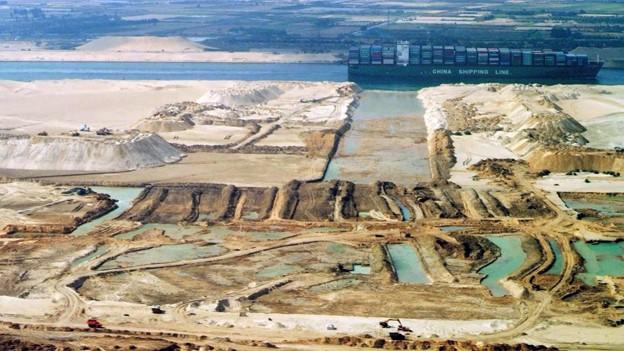
Egyptian government handout showing aerial view of construction of the second Suez Canal
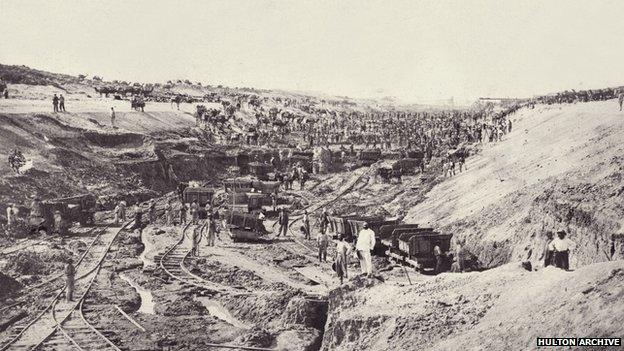
The original Suez Canal, which opened in 1869, took 10 years to build
Since then the project has moved into high gear, with building work around the clock.
The original Suez Canal, which opened in 1869, took 10 years to build.
Egypt's Investment Minister Ashraf Salman: "Twelve months is challenging, not unrealistic."
President Sisi has decreed that the new waterway will be completed in one.
Egyptian officials say the deadline will be met, and the first ship will navigate through the new canal in early August 2015.
Two-way traffic
The canal, which links the Mediterranean and the Red Sea, is the fastest shipping route between Europe and Asia.
It handles 7% of global sea-borne trade, and is one of Egypt's main sources of foreign currency income.
Suez Canal project
$8.5bn
raised for canal expansion project
$13.2bn
projected revenue by 2023 (up from $5.3bn)
-
72km of new channel and bypasses
-
97 ships a day by 2023 (up from 49)
-
11-hour southbound transit (down from 18)
-
12 months to complete project by Aug 2015
The new lane will allow two-way traffic in part of the canal, reducing transit and waiting times.
Officials say it will double the capacity of the existing waterway and almost triple revenues in fewer than 10 years, from $5.3bn (£3.5bn) in 2014 to $13.2bn in 2023.
As well as building a second channel, Egypt plans to create a major logistics and shipping corridor alongside the canal banks.
'Rebirth'
Officials have dubbed the project "the Great Egyptian Dream", and the nation has bought into it - quite literally.
The Egyptian public financed the new canal by investing $8.5bn in just eight days.
Officials say the expansion is about far more than the bottom line.
The project will be "a rebirth" for Egypt, according to the Head of the Suez Canal Authority, Adm Mohab Mameesh.
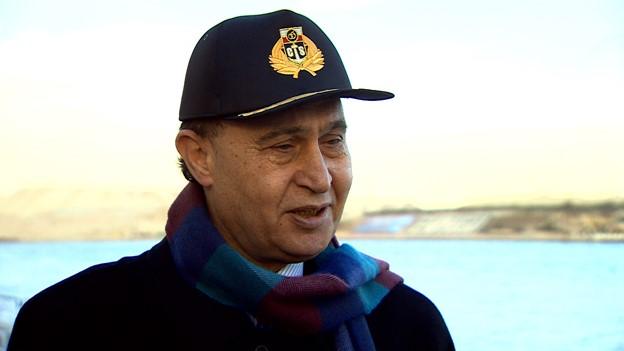
Adm Mohab Mameesh is confident ships can be protected from attacks by jihadist militants
"After the most difficult three years in our history, we are building a new Egypt," he told me at the water's edge.
"Our grandfathers were digging the Suez Canal, and we are digging the new Suez Canal not for us but for the future, for our children and our grandchildren, and for all the world."
Suez has been synonymous with national pride since 1956, when President Gamal Abdel Nasser seized the canal from the British and French, prompting them - and the Israelis - to attack.
The waterway later played a role in the Middle East wars of 1967 and 1973.
Adm Mameesh said it would now be part of a new battle - "a war of development".
Restricted access
We were given a tour on a tugboat, passing earthmovers and dump trucks on the banks, as well as some British war graves.
Fishermen bobbed past in sailboats, one holding up his catch.
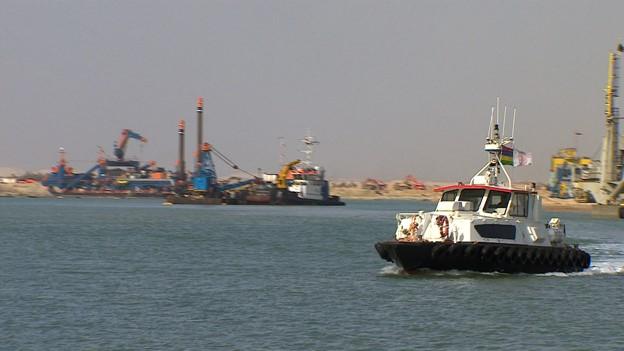
The Egyptian public has backed the project by investing $8.5bn (£5.6bn)
We nosed briefly into the new canal - about 20m (66ft) in - where huge dredging platforms sprout from the water.
This kind of access is rare - the canal area is under tight military control. The army engineering corps is leading the drilling.
There was a leak this week, caused by the collapse of a bridge, but officials said there were no injuries or delays with building.
'Ahead of schedule'
Ministers admit there is a great deal at stake, including Egypt's international credibility.
"I think it's crucial for restoring confidence," said Investment Minister Ashraf Salman.
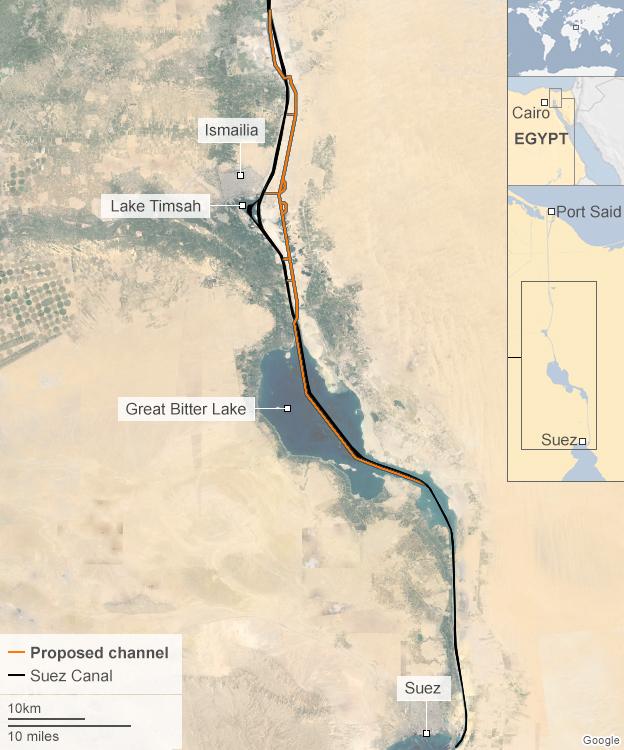
"It will show the whole world that Egypt is committed and into implementation. It will put Egypt on the map again."
That is if the project is completed successfully.
Some international experts predicted it would take five years. The minister insisted it would be finished in one.
"Actually it is challenging, not unrealistic," he told me.
"I think the Egyptians who have done two revolutions in two years are capable of something like that. We are monitoring this project every day. We are ahead of schedule."
Spending priorities
Some experts are dubious about the timeframe, others about the revenue projections.
They doubt the growth in global shipping in the coming years will justify Egypt's forecasts.
Some believe the money to build another waterway would be better spent elsewhere.
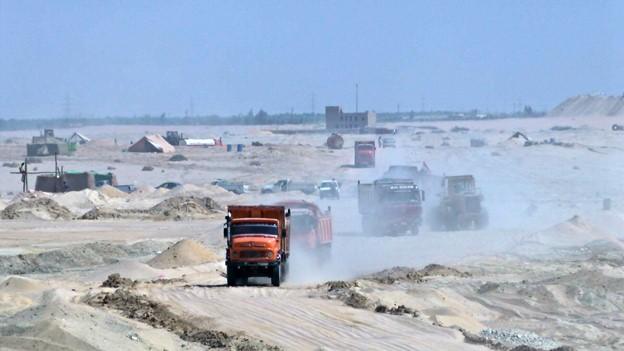
Egyptian officials believe the project could be finished by August 2015
"In the case of the Suez Canal it's a patriotic project first of all, and that's very difficult to quantify," said Cairo-based investment analyst Angus Blair, president of the Signet Institute.
"From an economic point of view it can be argued, and I think pretty well, that around $8bn could have been used on upgrading Egypt's infrastructure, power stations, mass public transport in the cities, new trams, and new housing."
Flagship project
There are also some concerns about whether the jihadist insurgency in part of the Sinai Peninsula, which borders the canal, could threaten the strategic waterway - which also serves as a transit route for the US Navy.
Insurgents managed to strike a container vessel with a rocket-propelled grenade in 2013, causing minor damage.
Adm Mameesh dismissed that attack as a one-off.
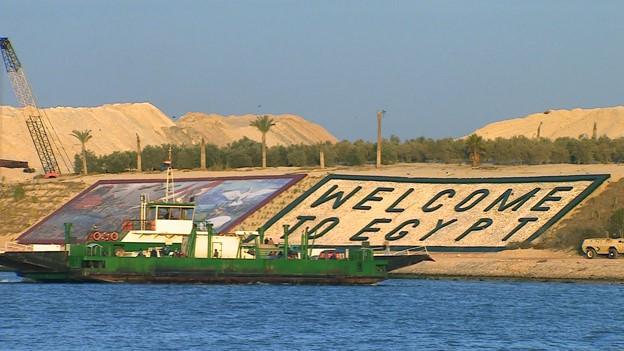
The new waterway will allow two-way traffic in part of the canal
"I was on board the first ship afterwards that same day, to send a message that the canal is very safe," he said.
"Since 25 January 2011 [the outbreak of the revolution which unseated Hosni Mubarak] navigation in the Suez Canal didn't stop for a second. It means we secure our canal very well."
The greatest risk may be for the Egyptian leader.
President Sisi needs flagship projects like this to deliver revenue, jobs and investment.
Otherwise the unrest, which lies below the waterline here, could resurface.
Now, as in the past, Egypt's fate is linked to the canal.